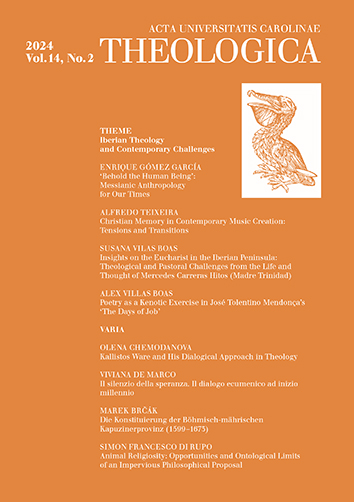AUC Theologica je recenzovaný odborný teologický časopis, který vychází dvakrát ročně. S výjimkou slavistických témat, recenzí a zpráv zveřejňuje příspěvky pouze ve světových jazycích – v angličtině, němčině, francouzštině a italštině.
Časopis se zaměřuje na širokou škálu teologických disciplín, jako je například systematická teologie, biblistika, patristika, pastorální a spirituální teologie, katechetika nebo církevní historie. V rámci nich se snaží reflektovat současná témata, která často vyžadují interdisciplinární přístup. Vítáme také teologické články, které se dotýkají jiných akademických oborů, jako je například filosofie, sociologie, literární věda či vědy přírodní.
Každé číslo se skládá ze dvou sekcí. Tematická sekce obsahuje články s jednotným zaměřením. V sekci s názvem „Varia“ publikujeme původní studie na různá aktuální teologická témata. Všechna čísla časopisu jsou dostupná v režimu Open Access.
AUC THEOLOGICA, Vol 11 No 2 (2021), 11–31
The Significance of Trinitarian Connotations in Bonaventure’s Epistemology for a Trinitarian Ontology
Jonathan Bieler
DOI: https://doi.org/10.14712/23363398.2022.2
zveřejněno: 03. 06. 2022
Abstract
Bonaventure’s epistemology is partly based on his Trinitarian theology. This paper investigates the Trinitarian connotations in this epistemology and their broader significance. Like the divine Father, any object of human understanding is liberally generating a likeness of itself: the species. Apprehending the form of the object through this species is an essential feature of human knowledge for Bonaventure. More fundamentally, the human soul itself is structured according to the Augustinian Triad of memoria, intellectus and voluntas, and the transcendentals of being correspond to the human soul’s structure: unum, verum and bonum. Both the human being and the transcendentals of being originate ultimately from the Trinitarian life or actuality, which is a self-relation in truth and love: The Father generates a Word and both together spirate the nexus between Father and Son: the Holy Spirit. Bonaventure’s notion of Trinitarian actuality as it is imaged in the human and being itself can help deepen Aquinas’ metaphysical notion of created esse as the actuality of all acts: An enriched notion of Trinitarian actuality necessarily involves, just as Hugo of St. Victor’s notion of love, a life of personal self-communication and reception, in the context of which the speech of divine ‘suffering’ makes sense, and does not involve mutability. Understanding Trinitarian actuality as the life of love exemplary for creation might open up vistas for a mutual fertilization between Thomistic metaphysics and Bonaventure’s Trinitarian theology, so as to further the development of a Trinitarian ontology without confusing the distinction between Philosophy and Theology.
klíčová slova: Bonaventure; Trinitarian ontology; Epistemology; Species; Transcendentals; Actuality

The Significance of Trinitarian Connotations in Bonaventure’s Epistemology for a Trinitarian Ontology is licensed under a Creative Commons Attribution 4.0 International License.
148 x 210 mm
vychází: 2 x ročně
cena tištěného čísla: 100 Kč
ISSN: 1804-5588
E-ISSN: 2336-3398
